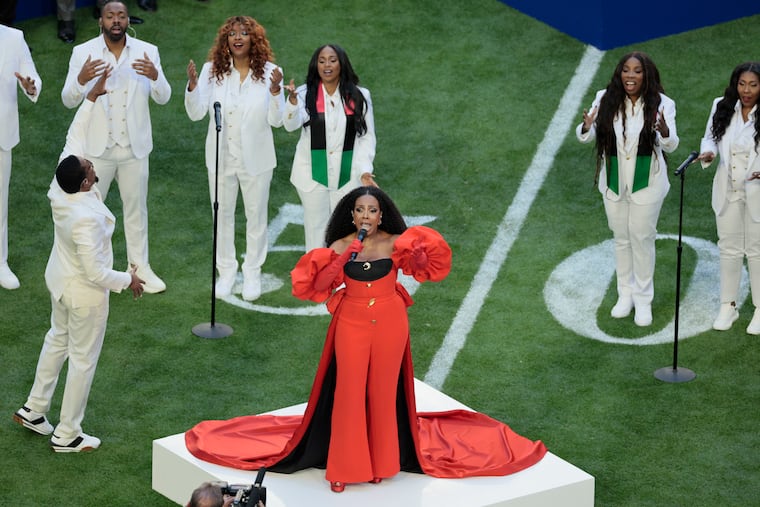‘Lift Every Voice and Sing’ belongs at the Super Bowl
The more we embrace the message of this essentially Christian song about faith and overcoming hard times, the closer the United States will come to truly living up to its ideals.

Years from now, I won’t remember which teams played in 2023′s Super Bowl.
But I will never forget the jaw-dropping performance Abbott Elementary star Sheryl Lee Ralph gave last year as she stood on the field in a bright red jumpsuit and sang “Lift Every Voice and Sing.” It was a moment. I never thought I would hear this song performed during the most-watched TV event of all time.
Sitting in front of the TV, I couldn’t help but wish my dad had been alive to see it. He would have been happy and so moved.
Predictably, conservatives had a hissy fit, calling the Black national anthem “divisive.”
Yeah, whatever.
But for me and many others, Ralph’s dazzling performance at an NFL game felt like an olive branch in light of all the racial justice protests that had been taking place for so long, and will most likely continue for the rest of my life. Instead of merely reacting, I wish that critics would take the time to analyze the lyrics of what is essentially a Christian song about faith and overcoming hard times.
Lift every voice and sing,
‘Til earth and heaven ring,
Ring with the harmonies of Liberty;
Let our rejoicing rise
High as the list’ning skies,
Let it resound loud as the rolling sea.
It’s not an overthrow-the-government song. Quite the opposite: It was written to honor the birth of President Abraham Lincoln. Black U.S. soldiers used to sing it on the battlefields of World War II to boost their morale.
I didn’t grow up singing “Lift Every Voice and Sing,” but my parents did. They learned it while attending racially segregated schools in the Jim Crow South. No matter which parent started singing, the other would always chime in. I can still hear my dad’s baritone booming out:
Sing a song full of the faith that the dark past has taught us,
Sing a song full of the hope that the present has brought us;
I could tell from the reverence in both of their voices that this was no ordinary song. It spoke to them about their struggles and their hopes for the future. Later, when I was attending Howard University, I would hear the tune at various events and try and sing along, too, always a little shy because I didn’t know all the lyrics.
Written by James Weldon Johnson in 1900, and set to music by his classically trained composer brother John Rosamond Johnson, schoolchildren performed it for the first time that same year at a segregated school in Jacksonville, Fla., where James was principal. The NAACP adopted “Lift Every Voice and Sing” as its official song in 1919. All of these years later, it remains a stirring staple at many Black church events and historically Black colleges and universities.
Given that February is Black History Month, it’s especially fitting that the Super Bowl once again will include the song in its lineup of patriotic music scheduled to be performed on Sunday, this year by Grammy Award winner Andra Day.
Yes, people will object. (They already are.)
Let them.
If some of them had their way, that awful statue of Confederate General Robert E. Lee would still be standing in Charlottesville, Va.
As much as conservatives like to whine about the so-called evils of diversity and DEI, they can’t stop racial progress in America. As Martin Luther King Jr. once said, “The arc of the moral universe is long, but it bends toward justice.”
Our nation’s forefathers may not have included racial inclusiveness in the Constitution, but it’s still one of America’s greatest strengths. The sooner more people embrace that as a core value of this country, the better off we all will be, and the closer the United States will come to truly living up to its ideals and promise.
As the words of “Lift Every Voice and Sing” so eloquently say:
Facing the rising sun of our new day begun,
Let us march on ‘til victory is won.